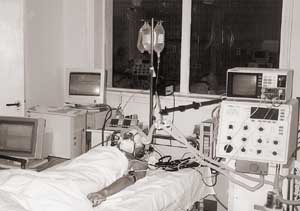Russian hospitals can not afford aiding patients in coma
A patient can stay in a state of coma for a very long time although a recovery cannot be guaranteed

The recent situation with Yasser Arafat's death has made the whole world pay attention, or at least think about the people, who stay in the state of coma. The word 'coma' was mentioned in almost every news report about the condition of the Palestinian leader. 
Coma translates from Greek as “deep sleep.” According to the modern perception, the term designates the highest degree of pathological inhibition of the central nervous system, which manifests itself in a profound loss of consciousness, the absence of reflexes for external irritations and disturbances of vital functions of human organism. Coma deprives the central nervous system of its basic governing function, which misbalances internal organs and systems, making them function independently on one another. As a result, a body loses the self-regulating ability to maintain the permanency of its internal environment.
There is a variety of reasons that can result in a coma. The reasons can be categorized in four major groups:
Intracranial processes – tumors, inflammations, vascular problems;
Respiratory system anoxaemia, blood circulation disorder;
Metabolic disorder linked with the endocrine system, first and foremost;
Various intoxications.
Comas can be primary (characterized with local deteriorations of the brain with subsequent pathological reactions from organs and systems) and secondary, which may develop as a consequence of a chronic disease such as liver impairment, diabetes, starvation, etc.
A stroke is considered the most frequent reason that makes an individual elapse into a coma. According to the Moscow ER center, a stroke comes first at this point with 57.2 percent of cases; a drug overdose follows with 14.5 percent. A coma is often caused with cranial injuries, medication poisoning and alcoholic intoxication. However, all those reasons are based on one and the same pathological process. A state of coma occurs due to a certain disturbance of nerve impulses, their formation and distribution in the brain. As a rule, such disturbance is caused with tissue respiration or metabolic disturbance.
Coma may lead to various complications, which can be highly dangerous too. Such complications are caused with brain injuries first and foremost: breathing disorder, edema of lungs, blood pressure fluctuations and cardiac arrest. The complications may lead to clinic and biological death.
The second group of complications can be described as a state connected with the central nervous system regulating function disturbance: nausea, urinary retention with a possible rupture of the urinal bladder and the development of peritonitis.
A patient can stay in a state of coma for a very long time, depending on his or her brain condition and the medical care. Modern medical appliances allow to maintain vital functions as long as possible, although a patient's recovery cannot be guaranteed.
There is a certain issue in medicine, which takes the question of coma from the medical to the moral and ethical field – euthanasia. It does not look like the dispute about this issue will ever end. Doctors and relatives of a dying patient may fight fiercely trying to prove a patient's right to live or die.
The condition that an individual was in prior to the state of coma and certain reasons that make a person fall into it are highly important too. An elderly man suffering from liver impairment has fewer chances to recover than a young man, who suffered a car accident.
Brain death is the only argument that can be used to support euthanasia. According to the international medical practice and the Russian law, brain death is categorized as the death of a human being. There is a special regulation approved by the Russian Healthcare Ministry, which ascribes the brain death to the death of a human being. The document gives a detailed description of nine clinical signs, the necessary data of laboratory and instrumental research, which allows to confirm the fact of a person's brain death. On most of the occurrences, the question takes a financial turn: not all hospitals can afford taking care of a person in coma. Most often doctors have to lay the burden on patient's relatives.
There was an occasion, when a girl elapsed into a coma for months after suffering numerous internal traumas. The girl was hospitalized at one of Moscow's respectable hospitals. Doctors believed that the case was hopeless: they intended to disconnect the patient from life-supporting systems. The girl's mother, however, insisted on the opposite. She took great care of her daughter, and the girl came out of the coma and recovered.
Subscribe to Pravda.Ru Telegram channel, Facebook, RSS!

